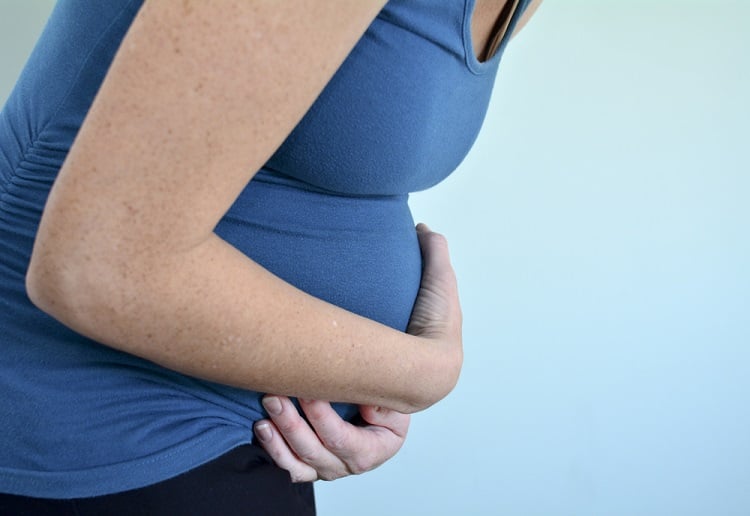Pregnant women are at increased risk of domestic violence in all cultural groups.
Women having a subsequent baby are more likely to disclose domestic violence than first time mothers.
Hannah Dahlen, Western Sydney University and Virginia Schmied, Western Sydney University
Domestic violence occurs across all age groups and life stages. Rather than reducing during pregnancy, expecting a child is a key risk factor for domestic violence beginning or escalating.
Our research, published today in the journal BMJ Open, found that 4.3% of pregnant women due to give birth in Western Sydney disclosed domestic violence when asked about it by a midwife at her first hospital visit. The study examined more than 33,000 ethnically diverse women who gave birth between 2006 and 2016, and found that these disclosures spanned all cultural groups.
Domestic violence in pregnancy not only causes distress and trauma for the mother and baby, it increases the risk of the baby having a low birth weight (very small baby) or being born prematurely (before 37 weeks), which is linked to jaundice, anaemia and respiratory distress in infancy, and diabetes and heart disease later in life.
Read more:
Midwives can help detect domestic violence – here’s how
Abuse and trauma
Depending on the state or territory, women may receive a “psychosocial” assessment from midwives when they first book into a public hospital during pregnancy. This screens for depression, anxiety, childhood abuse, domestic violence, support and stress.
Using these assessments, we found that 4.3% of women disclosed domestic violence overall, but rates were higher among women having a subsequent baby, compared with first-time mothers.
We’re unsure if this is because violence has escalated for these women with subsequent pregnancies; if they trust health providers more to disclose the violence; or if they seek help because they’re becoming more aware of the impact of domestic violence on their children.
We found a strong link between the disclosure of childhood abuse and the disclosure of domestic violence. Nearly 24% of women disclosing domestic violence had also disclosed childhood abuse.
This doesn’t mean that one causes the other, but women who experience childhood abuse are more vulnerable to re-victimisation (being abused again). They may feel like they’re not worthy and gravitate towards men who abuse them.
Women who disclosed domestic violence in our study were more likely to have a history of anxiety or depression (34%) and have thoughts of harming themselves.
This is concerning, as maternal suicide during pregnancy or following the birth appears to be rising and has now become one of the main causes of maternal death in Australia.
Read more:
We need to protect new mothers from trauma and suicide
We also found rising rates of pregnant women disclosing domestic violence and being admitted to hospital for bleeding and signs that labour may be starting early (before 37 weeks). When this happens, women are admitted to hospital to try to stop the labour, or to find the source of the bleeding. Sometimes stress can contribute to preterm birth and bleeding in pregnancy.
Ethnic backgrounds
We found that domestic violence occurred across all cultural groups, but reported rates were highest among women from New Zealand and Sudan.
Previous research has shown high rates of domestic violence among Maori women in some parts of New Zealand.
There is also evidence of high rates of domestic violence among Sudanese women prior to migration.
Read more:
Family violence victims need support, not mandatory reporting
We found that women born in India and China reported very low rates of domestic violence. This may reflect a cultural tendency not to discuss what is considered private family business with outsiders.
It’s important that health professionals know how to ask about domestic violence in a culturally appropriate way so women feel comfortable disclosing abuse and can access appropriate support.
What needs to be done?
Midwives need to consider cultural norms and acceptability when asking migrant women questions about domestic violence, and this must always be done in a way that keeps the woman safe. Partners should not be present when the questions are asked – and this may be done at another time in the pregnancy if necessary.
Where English is not the first language, interpreters should be used. But this can also present challenges if the interpreter comes from the same community and is known to the woman.
When women have continuity of midwifery care and get to know a midwife well throughout the pregnancy, it is easier for midwives to gain women’s trust and to notice when things change. This style of care should be rolled out more widely in Australian public hospitals.
Read more:
Acting on family violence: how the health system can step up
![]() The National Sexual Assault, Family & Domestic Violence Counselling Line – 1800 RESPECT (1800 737 732) – is available 24 hours a day, seven days a week for any Australian who has experienced, or is at risk of, family and domestic violence and/or sexual assault.
The National Sexual Assault, Family & Domestic Violence Counselling Line – 1800 RESPECT (1800 737 732) – is available 24 hours a day, seven days a week for any Australian who has experienced, or is at risk of, family and domestic violence and/or sexual assault.
Hannah Dahlen, Professor of Midwifery and Higher Degree Director, Western Sydney University and Virginia Schmied, Professor, Western Sydney University
This article was originally published on The Conversation. Read the original article.
Share your comments below




















-

-
-
mom81879 said
- 28 Jun 2018
-

-
-
Ellen said
- 07 May 2018

-

-
-
tessie said
- 03 May 2018
-

-
-
BellaB said
- 01 May 2018
-

-
-
mom206279 said
- 01 May 2018
-

-
-
mom93821 said
- 01 May 2018
Post a comment9:59 am
7:52 am
10:31 am
4:01 pm
8:10 am
-

-
-
mom93821 replied
- 02 May 2018 , 7:05 am
Reply6:36 am
To post a review/comment please join us or login so we can allocate your points.